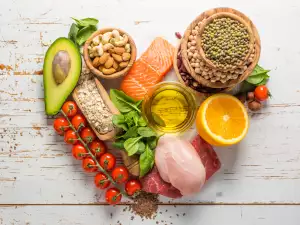Carbohydrates are the most important source of energy for the body. Ingested carbohydrates are broken down into simple sugars such as glucose by certain enzymes and can be used by the body in this form.
Therefore the metabolism of carbohydrates or sugar is a vital process in the human body. Carbohydrate metabolism controls the processes of assimilation, conversion, transport and breakdown of carbohydrates. The process takes place in several steps.
Carbohydrates are broken down in metabolism, absorbed through the wall of the small intestine and reach the body's cells through the circulatory system. Sugar molecules that are not needed for energy production are converted into fat molecules or stored in the liver and muscles. The end products of carbohydrate metabolism are excreted through the excretory system.
Along with proteins and fats, carbohydrates are among the main groups of nutrients that are obtained from food. Carbohydrates are divided into monosaccharides (single sugars), disaccharides (double sugars) and polysaccharides (multiple sugars). Important representatives of monosaccharides are fruit sugar (fructose), grape sugar (glucose) and mucilage sugar (galactase).
Carbohydrates that are taken in with food are mostly in the form of disaccharides or polysaccharides. In order for the body to use these nutrients, the sugar molecules must first be converted into glucose. For this purpose, the body releases enzymes during digestion that break down carbohydrates.

Glucose is broken down into what is known as adenosine triphosphate and in this form becomes an energy source for the body. The more complex the structure of carbohydrates, the longer it takes the body to transform them - the so-called complex carbohydrates.
The brain needs glucose as an energy source. After carbohydrates are broken down into glucose, the sugar is delivered to the body's cells through the bloodstream. If the cells no longer need more energy, the glucose in the body is reassembled into new starch molecules and stored as glycogen in the muscles and liver.
In a state of starvation or during increased physical exertion, glycogen can be broken down into glucose and provide the body with energy. Glycogen is a kind of storage of carbohydrates in the human body. However, these storage depots are limited. When everything is already full, the unused carbohydrates are turned into fat in the liver. These fats are stored in adipose tissue. If the energy supply is in excess of the requirement for a longer period of time, it leads to obesity.
If the metabolism does not function smoothly, there is a metabolic disorder. The body cannot use the nutrients it has absorbed and they do not get to where they are needed. A specific enzyme is responsible for each step of metabolism. Therefore, in the case of a metabolic disorder, there is an enzyme defect. The result is that substances accumulate where they should not and at the same time there is a lack of certain nutrients elsewhere in the body.
The most common disorder of carbohydrate metabolism is diabetes mellitus. This condition can be divided into two main groups. In type 1 diabetes, the cells in the pancreas that are involved in the production of insulin are destroyed. In type 2 diabetes there is no absolute insulin deficiency. Rather, the effect of insulin is reduced by resistance.
Insulin is the only hormone in the body that can lower blood sugar levels. After consuming carbohydrates such as potatoes, pasta and bread, the blood sugar level rises. A high blood sugar level signals that the cells are sufficiently supplied with energy. In this case, insulin is released, which promotes the absorption of glucose in muscle and fat tissue, which lowers the blood sugar level again.

Without insulin, the blood sugar level in the body remains constantly high. The body cannot transport energy from carbohydrates into the cells without insulin.
In addition, blood vessels are damaged and various diseases are caused such as circulatory disorders in the hands and feet, heart attacks, strokes and kidney diseases. Therefore, in diabetes mellitus, it is necessary to artificially provide the body with insulin.
Read more:
- Do you have carbohydrate intolerance;




















Comments